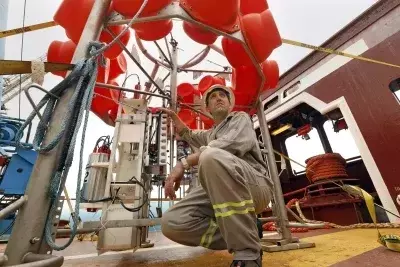





A contentious push for deep-sea mineral extraction is accelerating, driven by the Metals Company's pursuit of valuable resources on the ocean floor and bolstered by strategic support from the US administration. This endeavor represents a significant shift in resource acquisition, aiming to tap into vast reserves of critical minerals essential for modern technology and defense. However, this pioneering venture is not without its detractors; it sparks heated debates over environmental stewardship and international legal frameworks. The intersection of economic ambition, geopolitical strategy, and ecological responsibility forms the core of this unfolding saga, highlighting the complex challenges inherent in exploiting the planet's last untouched frontiers.
The current landscape of deep-sea mining is characterized by a delicate balance between potential economic gains and profound ecological risks. As the Metals Company prepares to launch its commercial operations, the world watches to see how these operations will be conducted and what precedents they will set. The unfolding events will test the resilience of international cooperation and environmental regulations, shaping the future of marine resource management for generations to come. This venture serves as a potent reminder of humanity's ever-increasing demand for resources and the innovative, albeit controversial, methods being considered to meet these needs.
Pioneering the Ocean's Depths: The Metals Company's Vision
The Metals Company, under the leadership of Gerard Barron, is set to revolutionize resource extraction by venturing into the deep ocean's Clarion-Clipperton Zone. This remote Pacific region is teeming with polymetallic nodules, which are rich in essential minerals like nickel and cobalt—components critical for defense and renewable energy technologies. Barron envisions this as a strategic move towards America's mineral self-sufficiency, drawing parallels with the nation's energy independence achieved through shale gas. His company's innovative approach involves collecting these nodules directly from the seabed, a method he asserts is more environmentally benign and less socially disruptive than traditional terrestrial mining. The company has already successfully demonstrated its extraction capabilities, retrieving thousands of tons of nodules during pilot tests.
Barron's long-held ambition to mine the deep sea, dating back to 2001, has culminated in this audacious project. He passionately argues that the ocean floor presents a unique opportunity, devoid of human habitation or agricultural value, making it an ideal site for mineral extraction. The Metals Company’s method involves a giant, remote-controlled vacuum system, designed to minimize disruption by leaving a portion of the nodules undisturbed and ensuring sediment plumes dissipate quickly. This approach, they claim, significantly lessens the ecological footprint compared to land-based mining, which often entails widespread habitat destruction and community displacement. The firm's conviction is rooted in studies suggesting that the CCZ's biodiversity is relatively lower than many terrestrial mining hotbeds, thereby implying a reduced environmental impact. This pioneering spirit, coupled with technological advancements, positions The Metals Company at the forefront of a new industrial frontier, promising a future where vital resources are sourced from the deep ocean.
Navigating Environmental Concerns and Geopolitical Currents
Despite the economic allure, the Metals Company's deep-sea mining ambitions are met with widespread apprehension, raising critical questions about environmental devastation and international law. Numerous nations and a vast community of marine scientists advocate for a moratorium on deep-sea mining, citing the profound ecological risks to an enigmatic ecosystem where new species are continually being discovered. Concerns include the destruction of seabed habitats, the potential for sediment plumes containing heavy metals to harm marine life, and the irreversible impact on a poorly understood environment. Critics stress that while the visual impact of ocean mining may be less apparent than land-based operations, the ecological consequences could be equally, if not more, severe.
The Trump administration's endorsement of deep-sea mining, through an executive order aimed at securing mineral supplies and countering China’s dominance, has ignited a geopolitical firestorm. This unilateral action challenges the established international governance of the deep seabed, which the International Seabed Authority (ISA) and most countries consider the common heritage of humankind. The U.S., not having ratified the treaty that established the ISA, asserts its autonomy, creating a rift in global consensus. This move has not only revitalized The Metals Company's prospects but also intensified the debate over sovereignty, resource access, and environmental protection in international waters. The unfolding scenario underscores a global struggle to reconcile economic imperatives with ecological preservation and the adherence to international legal norms, as the quest for critical minerals pushes humanity into the deep, unknown expanses of the ocean.
